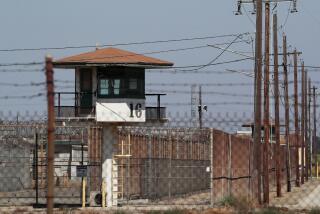AIDS Runs Rampant in S. Africa’s Prisons
- Share via
JOHANNESBURG, South Africa — Prisoners cram into cells soaked in grime and sweat. They share mattresses, tattoo needles and dirty razors. Rape is common.
South Africa’s prisons have become a breeding ground for the AIDS virus, and prisoners now represent one of the hardest-hit segments of a country plagued by the deadly disease.
Diseases associated with AIDS -- tuberculosis, for instance -- flourish in the packed and poorly ventilated cells. Other sexually transmitted diseases, which feed the spread of HIV, are rampant.
With weaker immune systems, prisoners are more contagious and less resistant to the virus. Those already infected fall ill and die more quickly. “HIV in South African prisons can be a death sentence,” said K.C. Goyer, who researched prisons for the South African Institute for Security Studies.
Between 1995 and 2001, deaths surged more than 500% in prisons, and AIDS is widely held responsible, according to Johannes Fagan, a judge in charge of monitoring prison conditions in South Africa.
More than 1,000 of the country’s 179,000 inmates died in prison last year. That number could soar to 45,000 a year by 2011 unless drastic steps are taken to improve conditions, health care and AIDS education, Fagan said.
Roughly 41% of all inmates carry HIV, far above the 20% adult infection rate nationwide, Goyer said. A more precise figure is not obtainable because the government does not force prisoners to take AIDS tests.
Although free testing is available, most prisoners -- fearing the stigma attached to the disease -- remain unwilling to be tested.
Sipho Maphisa, 21, keeps his spirits up dreaming of freedom outside Johannesburg Prison’s barbed-wire fence.
But asked about HIV and his hopes quickly yield to despair. Maphisa refuses to undergo testing for the deadly virus, convinced that it would kill him before he finishes the remaining 11 years of a 15-year sentence.
Having HIV “would condemn my whole life because I know I would die in this place,” said Maphisa, who was barred by government officials from revealing why he was imprisoned. “The support you need [in prison] is not enough.”
Activists said those open about their infection are treated cruelly and socially isolated because of a crushing stigma over HIV. Some like Maphisa deal with the disease by simply ignoring it. Other inmates, many of whom are born into a culture of violence and dire poverty, doubt whether knowing they are infected will help them.
“To worry about some long-term disease they can’t even see is meaningless to them,” said Sasha Gear, a researcher at the Center for the Study of Violence and Reconciliation. So risky behavior remains common.
Many share dirty tattoo needles and razors. Thousands are raped amid the lowered security from overcrowding. And consensual sex is often unprotected because prisoners rarely have immediate access to condoms.
The prisons are also terribly overcrowded, with more than 60 inmates commonly sharing a cell designed for 12 and the entire prison system operating 63% beyond capacity. This cramped environment helps spread tuberculosis and other deadly diseases that prey on AIDS patients.
Prisoners, like all other South Africans, do not have access to anti-AIDS medication through the public health system.
Many inmates contract AIDS before they end up in prison, experts say. Prison only makes those people sicker.
Although some countries test all prisoners and segregate those with HIV, South Africa does not, a position applauded by human rights activists.
A better solution, experts say, lies in curing inmates’ tuberculosis, expanding HIV education programs and providing anti-AIDS drugs. Relieving overcrowded prisons and making condoms readily available are also crucial, they say. Without these measures, the death toll will continue to rise, they say.
More to Read
Sign up for Essential California
The most important California stories and recommendations in your inbox every morning.
You may occasionally receive promotional content from the Los Angeles Times.













